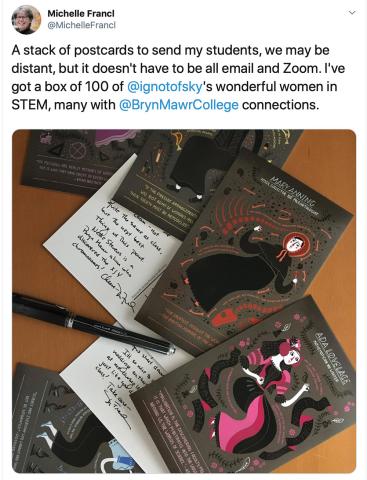The New (Normal) Classroom
The Bulletin shares some stories from the early days of the pandemic.
In the space of a week, Bryn Mawr courses migrated from face-to-face instruction in small classrooms to face-to-face teaching on Zoom. As students returned home or sheltered on campus, faculty across the disciplines raced to move courses online. Up and running in just a week, campus life, now virtual, had been transformed. Herewith, just some of the stories of pedagogy, innovation, and kindness that emerged in the midst of the coronavirus pandemic.
Michelle Francl (chemistry) kept busy attending to both her department colleagues and her students. For the former, she curated a virtual course resources document to help them figure out just how to move chemistry coursework online.
For her now-distant students, she stayed in touch by sending Women in STEM postcards. In an instance of serendipity, the postcard box includes some notable Bryn Mawr connections: Florence Bascom, who established Bryn Mawr’s geology department in 1901; Nettie Stevens, a 1903 Ph.D. in biology who discovered the X/Y chromosome; Emmy Noether, the mathematics professor whom Einstein called “the most significant creative mathematical genius thus far produced since the higher education of women began”; and Lise Meitner, a nuclear physicist who was a distinguished visitor on campus in the 1960s.
Daniel Torday (creative writing) reports, “In this wild moment, as we’re all hunkered down, I’ve decided to post here the responses to the books I’ll be teaching in my … novelwriting class. When we’re not workshopping, we’re reading a book a week. First up: Mary Gaitskill’s This Is Pleasure.” (You can sit in at danieltorday.com/novel-readings.)
The report from the classics department is upbeat. As luck would have it, both of Radcliffe Edmonds’ (Greek) courses—Cosmos: Myth, Medicine, and Law and a graduate seminar—are small discussion courses. “We have mostly just shifted the discussion to the Teams meeting, without need to improvise different strategies to compensate,” he writes. Plus, he reports that his colleagues seem to be managing the transition “with only minor glitches here and there—a testament to their learning curve with new technology.” Of course, time zones do complicate matters. For students in California, the 10 a.m. start time of their Elementary Greek class, taught by Asya Sigelman (Greek) translates to a challenging 7 a.m. Still, Edmonds hears from faculty and students alike that “the classes are still lively, as the students, in typical Bryn Mawr fashion, are dragging themselves out of bed at the crack of dawn to do their daily Greek.”
For his class, A Gendered History of the Avant Garde: Bodies, Objects, Emotions, Ideas, Alessandro Giammei (Italian) worked with Carrie Robbins (Curator, Academic Liaison for Art and Artifacts / history of art) to build the virtual gallery that is the culminating project of the semester. “Instead of asking students to give us texts and images and creating the gallery ourselves,” Giammei explains, “we will workshop every aspect of the project (including platforms to adopt and the visual identity of the final website) as a collective.”
For more, follow Bryn Mawr on Facebook and at #BrynMawrAtHome.
Published on: 05/27/2020
